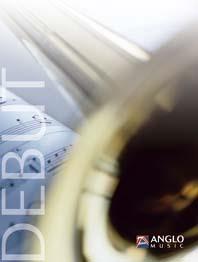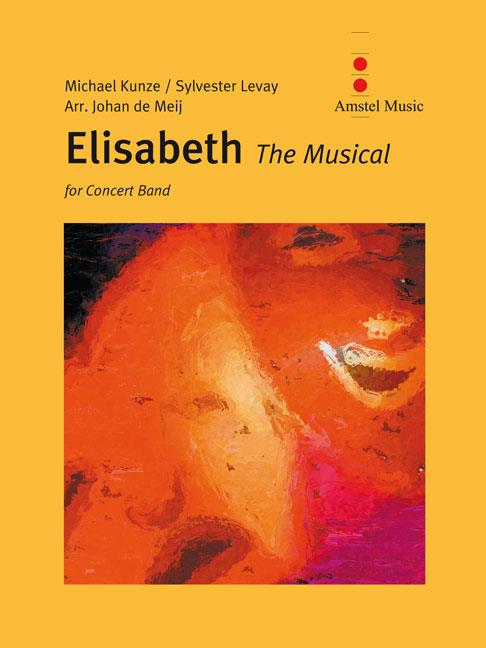Results
-
 £79.99
£79.99The Painted Desert (Concert Band - Score and Parts) - Sparke, Philip
The south-western US state of Arizona has more than its fair share of stunning landscapes, natural phenomena and National Monuments. Best known is the Grand Canyon, but there are also numerous deserts, a petrified forest, extinct volcanoes and the huge Sunset Crater. Not surprisingly, it has featured as the backdrop to many Western movies. The Painted Desert is a narrow, crescent-shaped arc about 160 miles long which begins near the Grand Canyon and varies in width from 10 to 35 miles. It is largely void of vegetation and years of erosion by wind and rain have exposed sedimentary layers of rock up to 250 million years old. Chemical differences in the various layers result in an effect not unlike a multicoloured layer cake with contrasting hues of red, orange and pink, blue, grey and lavender creating a silent and barren landscape which looks like it has been hand-painted. As with much of the planet's stunning landscapes all the observer can do is stand and stare.Duration: 3:45
Estimated dispatch 7-14 working days
-
 £118.99
£118.99Elisabeth (Concert Band - Score and Parts) - Levay & Kunze - De Meij, Johan
The world premiere of the musical Elisabeth took place in Vienna on September 3, 1992. From the great acclaim with which the musical was received, it became clear that the life of the Empress of Austria still appeals to the imagination. Although Elisabeth's life (1837-1898) as an Empress has a fairy-tale-like beginning, it takes a gloomy turn. In this production, Luigi Lucheni, the man who finally takes her life, tells her story. Death plays a major role throughout Elisabeth's life. In the musical, an equally mysterious and attractive man portrays the phenomenon of death, seducing her to the realm of death time after time. Elisabeth's life resembles a fairy tale when she marries the Emperor Franz Joseph at the age of sixteen. Her mother-in-law, Archduchess Sophie, does not make it easy on Elisabeth. But it is life itself that puts the Empress to the test. First, her youngest daughter dies. Then, not long after her son Rudolf is born, her happiness is clouded when her mother-in-law decides she must take pity on him. After her husband's unfaithfulness and Sophie's death, Elisabeth is so disillusioned that she chooses a travelling existence without realizing her husband and her son, Rudolf, miss her. Rudolf's loneliness is one of the reasons he commits suicide. The accumulation of disappointments in Elisabeth's life almost drives her into the arms of Death. In the end, however, it is Lucheni who kills her.Duration: 8.30
Estimated dispatch 7-14 working days
-
 £104.99
£104.99Ballabili (Concert Band - Score and Parts) - Verdi, Giuseppe - Van der Beek, Wil
Giuseppe Verdi's opera Macbeth was written in 1846/47 and premiered in Florence. It is based on Shakespeare's Macbeth and, unlike Verdi's other operas, had relatively little broad impact. This may be due to the difficulty of the singing voices, the lack of a love story or the dark mood, without humorous scenes.Musically, however, this opera is not uninteresting. Among other things, all the dramatic highlights culminate in artistically built ensembles. It also contains interesting instrumental effects, such as a wind orchestra under the stage in the witch scenes. This makes the witches and air spirits seem like from another world. In the 19th century opera, such a wind band, a so-called "banda" was not uncommon but an integral part of the scene.The Ballabili comes from Act III of Verdi's opera MacBeth. Ballabili is the plural of the Italian ballabile, meaning "danceable." It can also mean a dance performed by the corps de ballet, or by the chorus in an opera; or the music to accompany this dance.Duration: 2:15
Estimated dispatch 7-14 working days
-
 £149.99
£149.99Columbus Wind Band Set (Score & Parts)
Christopher Columbus was born in Genoa in 1451. His father was a wool merchant. Originally he seemed destined to follow in his father's footsteps, and thus sailed the oceans to countries as far apart as Iceland and Guinea. In 1476 his ship was sunk during a battle off the coast of Portugal. Columbus saved his own life by swimming to shore. In 1484 he conceived the idea of sailing to the Indies via a westward sea route, but it was only in 1492 that he was able to realize this plan. On this first voyage he was in command of three ships: the flag-ship, called the Santa Maria, the Pinta, and the Ni?a. From Spain Columbus sailed via the Canary Islands to the Bahamas, which he sighted on October 12th 1492. Without being aware of it Columbus discovered the 'New World' - he thought he had landed in the eastern part of Asia. The motif from Dvo??k's 9th Symphony 'Aus der neuen Welt' forms a little counterfeit history at this point in the composition. After this first voyage Columbus was to undertake another three long voyages to America. These voyages were certainly not entirely devoid of misfortune. More than once he was faced with shipwreck, mutiny and the destruction of settlements he had founded. After Columbus had left for Spain from Rio Belen in 1503, he beached his ships on the coast of Jamaica. The crew were marooned there and it was only after a year that Columbus succeeded in saving his men and sailing back to Spain with them. In the music the misunderstanding about which continent Columbus discovered in his lifetime resounds, for does this part in the composition not contain Asiatic motifs? Poor Columbus! In 1506 the famous explorer died in Valladolid. 09:00
Estimated dispatch 7-14 working days
-
 £54.99
£54.99Flashback Wind Band Set (Score & Parts)
Which of us does not have them, memories? Everyone sometimes remembers things from the past, be they happy memories or not. Sometimes, a scent may remind us of a particular place, or a tune may bring back memories of a certain situation. John DeBee experienced something similar when he heard a song on the radio: he immediately picked up his pen and composed 'Flashback'. It has become a piece that appeals to the ear, which will provide both the musicians performing it and their audience with pleasant memories. 02:45
Estimated dispatch 7-14 working days
-
 £149.99
£149.99Heaven and Earth Wind Band Set (Score & Parts)
An Astrological Composition. Astrology is based on the principle that each sort of time has its own quality. In order to determine the quality of a particular moment, an astrologer looks at the position of the planets in the solar sustem at that moment. Each planet has specific types of energies and its location provides unique information for a certain moment on Earth. Thus: its position in the sky tells something about what happens on Earth. In this composition the types of energies of four planets are musically translated. The four planet were not randomly chosen. There are two pairs, whose influence and energy are opposite. Venus and Mars. Venus represents the feminine principle: harmony, beauty, art, and the ability to make relationships and to keep the peace. Venus connects, and communicates in order to maintain the balance. Mars represent the masculine principle: winning, impulsiveness, enthusiasm, and sexual energy for procreation. He creates war enabling the strongest to triumph. Mars is musically depicted in a stirring march in which enthusiasm characterises the masculine character. Saturn and Jupiter. Saturn represents concentration and withdrawal: the strong notion of responsibility, seriousness, self-discipline and melancholy. Saturn is the hermit who will conquer his fears and worries in minimal conditions and by self-chastisement. This contemplative character is depicted in the music as if it is almost standing still, which also reflects the given character of this planet. Jupiter represents growth and expansion: the positive, self-confidence, the good Samaritan, the healer. Jupiter is the philosopher who will make the world a better place, sees future possibilities, and searches for eternal values. He is the prophet who sometimes rants and raves his doctrine and proclamations, resulting musically in a whirling and upbeat finale. not looking back at what has been but searching for new challenges. "Heaven and Earth" was commisioned by the Music Lending and Information Centre (MUI), a department of the library for the province of Gelderland in Arnhem, The Netherlands.Een astrologische compositie. Astrologie is gebaseerd op het principe dat elke tijd zijn eigen kwaliteit heeft. ""Tijd voor koffie"" of ""het was je tijd nog niet"" als bijvoorbeeld een baan aan je neus voorbij is gegaan. Om de kwaliteit van een moment te lezen kijkt de astroloog naar de stand van de planeten in ons zonnestelsel op dat tijdstip. Elke planeet heeft specifieke energie?n en de plaats aan de hemel geeft unieke informatie over een bepaald moment op aarde. Oftewel: de stand aan de hemel (Ouranos) vertelt iets over wat er op aarde (Gaia) gebeurt. In deze compositie worden de energie?n van vier planeten muzikaal vertaald. De vier planeten zijn niet lukraak gekozen. Het zijn twee paren, die qua invloed en energie tegenovergesteld zijn. Venus en Mars. Venus vertegenwoordigt het vrouwelijke principe: harmonieus, schoonheid, de kunst, het vermogen om verbindingen aan te gaan en de vrede te bewaren. Venus geeft door en verbindt om de balans te bewaren. Mars vertegenwoordigt het mannelijke principe: winnen, anderen aftroeven, impulsief en enthousiast, seksuele energie voor de voortplanting. Mars cre?ert oorlog om de sterkste te laten zegevieren. Venus staat tot Mars als vrede staat tot oorlog, als verbinden staat tot verbreken, als harmonie staat tot competitie. Jupiter en Saturnus. Jupiter vertegenwoordigt groei en expansie: het positieve zelfvertrouwen, de weldoener, de genezer. Jupiter is de filosoof die de wereld wil verbeteren, vooruitkijkend en zoekend naar eeuwige waarden, de profeet die soms al te bombastisch zijn leer verkondigt. Saturnus vertegenwoordigt concentratie en inkrimping: het sterke verantwoordelijkheidsbesef, soberheid, zelfdiscipline en melancholie. Saturnus is de kluizenaar die onder minimale voorwaarden en zelfkastijding zijn angsten wil overwinnen. De harde, serieuze werker die volgens vaste regels stug doorgaat om aan zijn hoge eisen te voldoen. Jupiter staat tot Saturnus als uitbreiding staat tot inkrimping, als zelfvertrouwen staat tot faalangst, als vrijheid staat tot structuur. 11:00
Estimated dispatch 7-14 working days
-
 £174.10
£174.10Do Dat Thing - Harry Connick Jr.
Harry Connick Jr. is an American pianist, singer, composer and actor from New Orleans. He has released many albums and perform frequently with his own big band. "Do Dat Thing" is a real "feel-good" song composed in New Orleans style. The tempo must not be too fast. A kind of rough, heavy groove is preferred. When staccato is notated, the 8th notes have to be straight. The notations in the Drums-part is optional. From 35, the rhythm in the bass-line is meant as information for the musician. Be aware of the dynamics from the beginning (not too loud) to give it a "lift" at the end of the piece.
Estimated dispatch 7-14 working days
-
£107.70
Triqui-Traqui - Paul Desenne
Commissioned by Gustavo Dudamel for his 2017 New Year's concert with the Vienna Philharmonic, my Caribbean reinterpretation of Strauss' famous Tritsch-Tratsch Polka was deemed tooosefor the occasion, yet the maestro recorded it that year, not in Vienna but in Caracas, with the fabulous performers of his orchestra, the Orquesta Sinfnica Simn Bolvar, and published it on the web as his musical New Year's greetings card. The gesture was meaningful, and bold. I'm convinced that Johann Strauss, a man immersed in the fashions of his city and his time, would have loved the idea; a musical collage which carries in its banter a very strong aesthetic statement. The lightest and most frivolous things seem to always carry the deepest messages, let us not forget. ... ... Today, this version of my transformed Tritsch- Tratsch Polka forSymphonic Band created by Steve Boehm, will certainly tickle the Viennese in each and every one of us, and we will be very happy!"
Estimated dispatch 7-14 working days
-
 £67.95
£67.95Ever Forward, Ever Onward - Amy Webb
Ever Forward, Ever Onward is a wonderful piece written in concert B-flat and only uses notes within the scale. The clarinets do not go over the break. If students have been playing for at least a semester, this piece will be just challenging enough to make them want to work, but not so hard that they give up. The lines are interesting, too, no matter what instrument you can play. Students will love to play this and I hope you have fun. 1st trumpet's highest note is A.
Estimated dispatch 7-14 working days
-
 £69.99
£69.99Mirage - Jacob de Haan
A mirage is an illusion, something without substance that does not really exist. Although not real, its unattainable nature is perfect for musical inspiration. Composer Jacob de Haan was strolling through a picturesque forest of the Dutch Gelderland when he thought he saw a body of water. While there was no water, its mere image created waves that can be relived in De Haan's original composition, Mirage.
Estimated dispatch 7-14 working days
